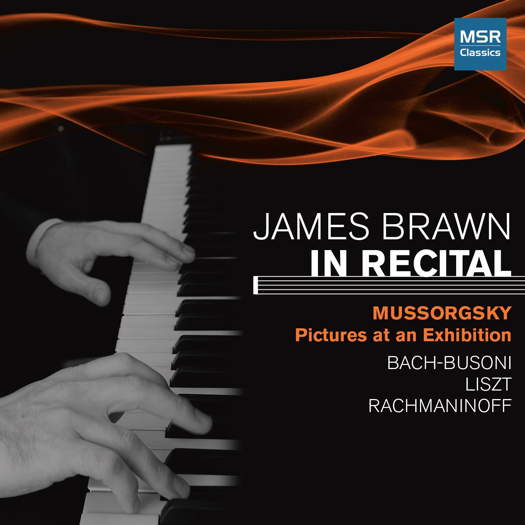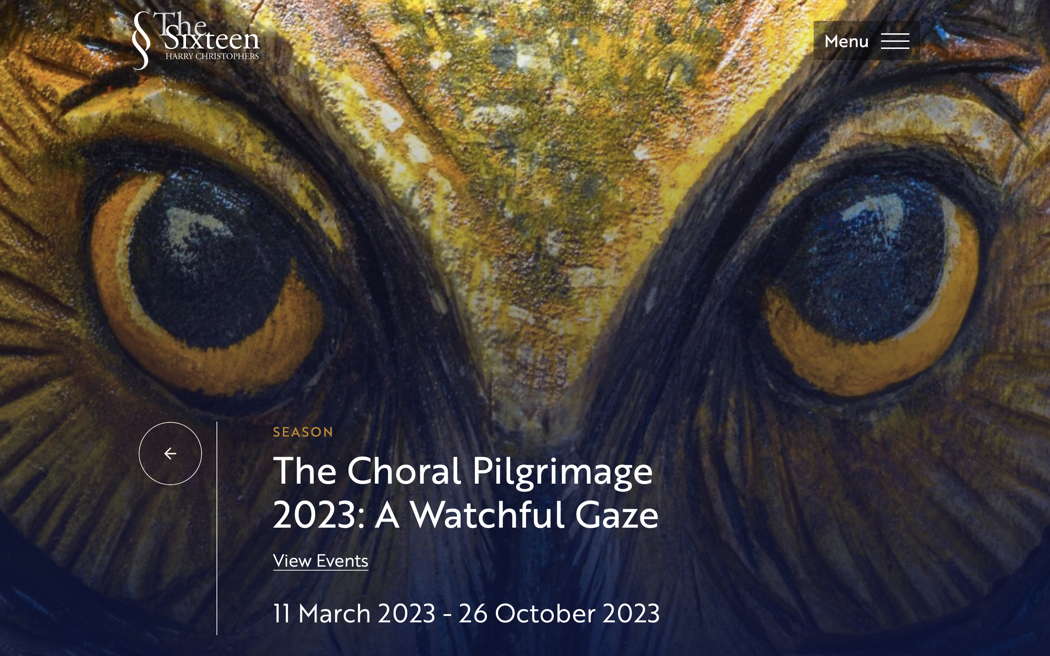- Martinů
- Kirsten Flagstad
- Leon Mendelson
- Lyndsie Holland
- Carlo Gesualdo
- Franz Krommer
- Jasper Quartet
- Brahms: Paganini Variations
 DISCUSSION: What is a work? John Dante Prevedini leads a discussion about The performing artist as co-creator, including contributions from Halida Dinova, Yekaterina Lebedeva, Béla Hartmann, David Arditti and Stephen Francis Vasta.
DISCUSSION: What is a work? John Dante Prevedini leads a discussion about The performing artist as co-creator, including contributions from Halida Dinova, Yekaterina Lebedeva, Béla Hartmann, David Arditti and Stephen Francis Vasta.
 SPONSORED: CD Spotlight. True Command - James Brawn plays Bach, Liszt, Musorgsky and Rachmaninov - recommended by Andrew Schartmann.
SPONSORED: CD Spotlight. True Command - James Brawn plays Bach, Liszt, Musorgsky and Rachmaninov - recommended by Andrew Schartmann.
All sponsored features >>
Byrd in Context
MIKE WHEELER hears The Sixteen
The Sixteen's annual Choral Pilgrimage with conductor Harry Christophers takes them to cathedrals and other venues all over the UK and Ireland. As you would expect, this year's tour acknowledges the four hundredth anniversary of William Byrd's death. But rather than offering Byrd wall-to-wall, the programme placed four of his Latin motets, and two English anthems, not only against the backdrop of the persecuted Catholic communities he represented and composed for, but also in the wider context of works by three European contemporaries, and two new commissions from Dobrinka Tabakova. In two instances, this also offered the chance to compare settings of the same text - Derby Cathedral, Derby, UK, 12 May 2023.

Online publicity for The Sixteen's Choral Pilgrimage 2023: A Watchful Gaze
Byrd's Arise Lord into thy rest was an apt choice of opener, the word-painting on 'arise' engaging our attention, as well as offering a counterbalance to the penitential tone of much of what followed. Netherlands lutenist and composer Philip van Wilder settled in London in the 1520s. His secular chanson O doux regard similarly rises from an initial low sonority - typical of the connections the programme draws attention to, without forcing the issue.
Byrd's two-part motet Ne irascaris / Civitas sancti tui, while clearly addressed to his beleaguered fellow-Catholics, can also have wider resonances. The lightening of the atmosphere at 'populos tuos' at the end of Part 1 was a compelling foil to the desolation at the end of Part 2. The Sixteen effectively laid out the antiphonal exchanges between high and low voices at 'Sion deserta', and caught the tone of restrained grief in the overlapping entries on 'desolata est'.
Phillipe de Monte travelled to England in 1554 to sing at the wedding of Philip of Spain and Mary Tudor, and Byrd and Tallis may have met him. His motet O suavitas et dulcedo lightened the mood, in the choir's aptly mellifluous reading.
Then came the first of the two commissions by Dobrinka Tabakova. Arise Lord into thy rest opens with word-painting similar to that of Byrd's setting, and balances polyphonic and chordal passages, and there are occasional echoes of late Vaughan Williams in some of the harmonic progressions. Julie Cooper's soprano solo soared magnificently over the choral textures.
Jacobus Clemens Non Papa's Tristitia et anxietas closed the first half with a return to a plaintive, penitential mood. Byrd's setting of a shorter version of the same text, which followed the interval, naturally inhabits a similar expressive world, with a more palpable sense of withdrawal at 'Vae mihi' (Woe is me). In Byrd's Turn our captivity, O Lord, the change of mood from sowing in tears to reaping in joyfulness was adroitly navigated.
Following a radiant account of Ego flos campi by Clemens Non Papa, Dobrinka Tabakova's Turn our captivity, O Lord made an interesting comparison with Byrd's setting. Occasional little melodic flicks in individual melodic lines suggested the Byzantine chant that she refers to in the printed programme. Unlike the Byrd, there is no abrupt shift in tone for the final section; the change is more gradual, but equally effective.
The evening ended with three works that would have spoken directly to Byrd's fellow-Catholics. Phillipe de Monte, Andrew Stewart's programme note told us, actually sent Byrd a copy of his Super flumina Babylonis, the lament of the Hebrews in captivity. The text of Byrd's Quomodo cantabimus? overlaps de Monte's, a point underlined by The Sixteen moving from one to the other without a break. Byrd's sideways harmonic move at 'Memor esto Domine' was a spine-tingling moment. The urgency of Byrd's Vigilate was reinforced by the choir's rhythmic vigour at 'an galli cantu' (at cockcrow). The message to be on your guard could scarcely have had a more receptive audience than the communities Byrd was addressing.
Throughout the evening, The Sixteen's usual virtues were on display, with balance, tuning, elegant phrasing and perfectly placed cadences all in the service of the music's expressive requirements.
Copyright © 18 May 2023
Mike Wheeler,
Derby UK



